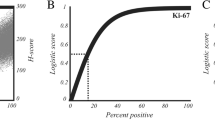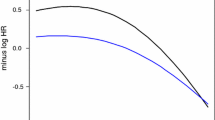Abstract
Background: Many new prognostic factors for breast cancer have been described, and yet the ability to predict patient outcomes remains poor. Overexpression of p-glycoprotein (p-gp), the multidrug resistance efflux pump, confers a worse prognosis to patients with certain leukemias and other tumors. The purpose of this study was to analyze the potential usefulness of p-gp expression as a prognostic factor in patients with breast cancer.
Methods: Paraffin blocks were obtained from 55 previously untreated patients who underwent surgery between 1987 and 1988. To determine p-gp expression, tumor cell suspensions were incubated with the p-gp-specific C219 monoclonal antibody and analyzed using an indirect immunofluorescent flow cytometric assay.
Results: Twenty-four (44%) of the tumors were p-gp positive and 31 (56%) were p-gp negative. Among the p-gp positive patients, 65% had recurrence of their disease, whereas only 13% of the p-gp negative patients experienced recurrence (p=0.0001). The 5-year disease-free rate for p-gp positive patients was 39% compared with 83% for p-gp negative patients (p=0.0001). In univariate analysis examining 10 different variables, significant predictors of recurrence were p-gp, stage, and tumor size. Multivariate analysis using Cox Proportional Hazards regression showed that only p-gp and stage were significant independent predictors of recurrence (p=0.0002).
Conclusions: p-gp is frequently expressed in patients with untreated breast cancer, with p-gp-positive patients being at significantly greater risk for disease recurrence. p-gp appears to be a useful prognostic factor in breast cancer and could potentially help guide management.
Similar content being viewed by others
References
The American Cancer Society.Cancer facts and figures, 1995. Atlanta, GA: The American Cancer Society.
Fisher B, Redmond C, Dimitrov NV, et al. A randomized clinical trial evaluating sequential methotrexate and fluorouracil in the treatment of patients with node-negative breast cancer who have estrogen-receptor-negative tumors.N Engl J Med 1989;320:473–8.
Piccart MJ, deValeriola D, Parideans R, et al. Six-year results of a multimodality treatment strategy for locally advanced breast cancer.Cancer 1988;62:2501–6.
Winchester DP. Adjuvant therapy for node-negative breast cancer: the use of prognostic factors in selecting patients.Cancer 1991;67(suppl):1741–3.
Clark GM, McGuire WL. Steroid receptors and other prognostic factors in primary breast cancer.Semin Oncol 1988;15(suppl):20–5.
Osborne CK. Prognostic factors for breast cancer: have they met their promise?J Clin Oncol 1992;10:679–82.
Juliano RL, Ling V. A surface glycoprotein modulating drug permeability in Chinese hamster ovary cell mutants.Biochem Biophys Acta 1976;455:152–62.
Beck WT. The cell biology of multiple drug resistance.Biochem Pharmacol 1987;36:2879–87.
Wallner J, Depisch D, Gsur A, Gotzl M, Haider K, Pirker R. MDR1 gene expression and its clinical relevance in primary gastric carcinomas.Cancer 1993;71:667–71.
Mickisch G, Bier H, Bergler W, Bak M, Tsschada R, Alken P. P-170 glycoprotein, glutathione and associated enzymes in relation to chemoresistance of primary human renal cell carcinomas.Urol Int 1990;45:170–6.
Chan HSL, Haddad G, Thorner PS, DeBoer G, Lin YP, Ondrusek N, Yeger H, Ling V. P-glycoprotein expression as a predictor of the outcome of therapy for neuroblastoma.N Engl J Med 1991;325:1608–14.
Chan HSL, Thorner PS, Haddad G, Ling V. Immunohistochemical detection of p-glycoprotein: prognostic correlation in soft tissue sarcoma of childhood.J Clin Oncol 1990;8:689–704.
Dalton WS, Grogan TM, Rybski JA, et al. Immunohistochemical detection and quantitation of p-glycoprotein in multiple drug-resistant human myeloma cells: association with level of drug resistance and drug accumulation.Blood 1989;73:747–52.
Miller TP, Grogan TM, Dalton WS, Spier CM, Scheper RJ, Salmon SE. P-glycoprotein expression in malignant lymphoma and reversal of clinical drug resistance with chemotherapy plus high-dose verapamil.J Clin Oncol 1991;9:17–24.
Goasguen JE, Dossot J, Fardel O, et al. Expression of the multidrug resistance-associated P-glycoprotein (P-170) in 59 cases of de novo acute lymphoblastic leukemia: prognostic implications.Blood 1993;81:2394–8.
Campos L, Guyotat D, Archimbaud E, et al. Clinical significance of multidrug resistance P-glycoprotein expression on acute nonlymphoblastic leukemia cells at diagnosis.Blood 1992;79:473–6.
Michieli M, Raspadori D, Damiani D, et al. The expression of multidrug resistance-associated glycoprotein in B-cell chronic lymphocytic leukaemia.Br J Haematol 1991;77:460–5.
Benchimol S, Ling V. P-glycoprotein and tumor progression.J Natl Cancer Inst 1994;86:814–6.
Weinstein RS, Hansen KK, McBeath RB, Dalton WS. Expression of the MDR1 gene (p-glycoprotein) in breast cancer.Recent Results Cancer Res 1993;127:49–54.
Kang Y, Perry RR. Modulatory effects of tamoxifen and recombinant human α-interferon on doxorubicin resistance.Cancer Res 1993;53:3040–5.
Verrelle P, Meissonnier F, Fonck Y, et al. Clinical relevance of immunohistochemical detection of multidrug resistance P-glycoprotein in breast carcinoma.J Natl Cancer Inst 1991;83:111–6.
Hill RP. Tumor progression: potential role of unstable genomic changes.Cancer Metastasis Rev 1990;9:137–47.
Weinstein RS, Jakate SM, Dominguez JM, et al. Relationship of the expression of the multidrug resistance gene product (P-glycoprotein) in human colon carcinoma to local tumor aggressiveness and lymph node metastasis.Cancer Res 1991;51:2720–6.
Rofstad EK. Radiation sensitivity in vitro of primary tumors and metastatic lesions of malignant melanoma.Cancer Res 1992;52:4453–7.
Ullrich SJ, Anderson CW, Mercer WE, Appelle E. The p53 tumor suppressor protein, a modulator of cell proliferation.J Biol Chem 1992;267:15259–62.
Chin K-V, Ueda K, Pastan I, Gottesman MM. Modulation of activity of the promoter of the human MDR1 gene by Ras and p53.Science 1992;255:459–61.
Zastawny RL, Salvino R, Chen J, Benchimol S, Ling V. The core promoter region of the p-glycoprotein gene is sufficient to confer differential responsiveness to wild-type and mutant p53.Oncogene 1993;8:1529–35.
Schneider J, Rubio M-P, Barbazan M-J, Rodriguez-Escudero FJ, Seizinger BR, Castresana JS. P-glycoprotein, HER-2/neu, and mutant p53 expression in human glynecologic tumors.J Natl Cancer Inst 1994;86:850–5.
Bradley G, Naik M, Ling V. P-glycoprotein expression in multidrug-resistant human ovarian carcinoma cell lines.Cancer Res 1989;49:2790–6.
Merkel DE, Fuqua SA, Tandon AK, Hill SM, Buzdar AU, McGuire WL. Electrophoretic analysis of 248 clinical breast cancer specimens for P-glycoprotein overexpression or gene amplification.J Clin Oncol 1989;7:1129–36.
Schneider J, Bak M, Efferth T, Kaufmann M, Mattern J, Volm M. P-glycoprotein expression in treated and untreated human breast cancer.Br J Cancer 1989;60:815–8.
Krishan A, Sauerteig A, Stein SH. Comparison of three commercially available antibodies for flow cytometric monitoring of P-glycoprotein expression in tumor cells.Cytometry 1991;12:731–42.
Charpin C, Vielh P, Duffaud F, et al. Quantitative immunocytochemical assays of p-glycoprotein in breast carcinomas: correlation to messenger RNA expression and to immuno-histochemical prognostic indicators.J Natl Cancer Inst 1994;86:1539–45.
Ro J, Sahin A, Ro JY, Fritsche H, Hortobagyi G, Blick M. Immunohistochemical analysis of P-glycoprotein expression correlated with chemotherapy resistance in locally advanced breast cancer.Hum Pathol 1990;21:787–91.
He LR, Huang XF, Hao CY, Lin BY, Wang Y, Gao F. Evaluation of p-glycoprotein expression as a prognostic factor in breast cancer [Abstract 78].Breast Cancer Res Treat 1994;32(suppl):48.
Author information
Authors and Affiliations
Rights and permissions
About this article
Cite this article
Gregorcyk, S., Kang, Y., Brandt, D. et al. p-Glycoprotein expression as a predictor of breast cancer recurrence. Annals of Surgical Oncology 3, 8–14 (1996). https://doi.org/10.1007/BF02409045
Received:
Accepted:
Issue Date:
DOI: https://doi.org/10.1007/BF02409045




